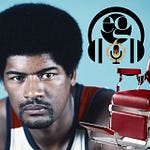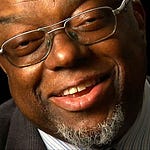
On today’s show we are joined by special guest Lynne Toye to discuss the Black image in arts and sports. Today’s discussion is based upon an article that Andre Kimo Stone Guess two years ago about the release of the Marvel movie Black Panther. That article is presented in its entirety below.
You can find this and other episodes of The Hank and Herb Show on Apple Podcasts and Spotify.


February 16, 2018 reminds me of November 4, 2008. The only thing in recent memory that I can equate to the response and anticipation of the release of Marvel’s Black Panther in the black community is the 2008 election of Barack Obama. I haven’t seen as much hoopla, hype and hysteria come from black folks about the likes of Wakanda and Afrofuturism since the days of “Hope and Change” and “Yes We Can”.
Seeing the similarities of how this has unfolded has led me to the the question of why. Why all of this for a black superhero movie? As I pondered the question, I heard the sage words of one of my dear friends ring in my ear – “It’s all about identity, my brother.”
As blacks in this country we suffer from an identity crisis that is a direct result of the evil twins of white supremacy and black inferiority. In my opinion, black inferiority is the most enduring and cancerous vestige of chattel slavery for the black community.
Black imagery disseminated through media and art help to shape the black self image and self esteem and can significantly contribute to the perpetuation of black inferiority.
W.E.B. Dubois knew this nearly a century ago. In a 1926 article in the NAACP’s publication, The Crisis, he states,
“…All Art is propaganda and ever must be, despite the wailing of the purists…I do not care a damn for any art that is not used for propaganda. But I do care when propaganda is confined to one side while the other is stripped and silent.”
DuBois was decrying the unbalanced and often negative view of blacks that whites propagated in society through art.
In today’s media saturated world, art and her actors are one of the gears that grind in the capitalistic machine. Art is a vehicle that is used to drive the masses to a particular place for the purpose of a pitch – “Now that I have your attention let me interest you in this product that I’m selling.” The commodification and distribution of art has a capitalistic agenda and another even more important agenda – propaganda.
While the propaganda angle has often been to the detriment of the black self image, a movie like Black Panther has the unique ability to accomplish a rare double feature – commercial success and positive propaganda for black culture. But is that positive propaganda sustainable?
I remember the feeling of euphoria and pride I had as I stood in line for over an hour to vote for Obama over 9 years ago. Unfortunately, some if not most of that “good feeling” has subsided, not so much because of how I view myself but because of the image that I see in society’s mirror staring back at me.
I’ll be honest with you. When I sat down to write this piece I wasn’t sure how I felt about the movie or if I even wanted to go see it. I initially thought it was yet another attempt to capitalize on the dearth of positive black imagery in popular culture. However, harkening back to DuBois’ words made me change my mind so I will venture out to stand in line with the masses to see the movie.
My hope for those of us who stand in line to see this blockbuster is that we somehow receive a positive boost to our cultural immune system that will help ward off the ill effects of black inferiority in a world where white supremacy has gone viral.
And even if this ends up being the case, we can’t wait 9 years for another event like this to help sustain us. We must create multiple opportunities to build upon the black self image – to continue to inoculate ourselves from the scourge of black inferiority.
Fortunately, we are certainly not stripped and silent anymore. I celebrate the new black voices in television and film – Ryan Coogler, Donald Glover, Issa Rae, Shonda Rhimes, Kenya Barris, Salim and Mara Brock Akil, and Larry Ridley to name a few. While I’m sure that it took a lot for each of them to climb to the top of their respective media summits, whether they realize it or not the image of blacks and black culture that emanates from their mountaintops will have a profound impact on black culture and black self-image.
It is incumbent upon them and those who will come after them to take up the mantle of cultural inoculation.
While it may be unfair to place such a responsibility on the backs of individual artists like these, the bottom line is that their portrayal of black culture through their art does and will have a significant and lasting effect on the culture and how we view ourselves and can even feed the cancer of black inferiority.
Dubois knew the importance of this. Later in the article he says,
“It is not the positive propaganda of people who believe white blood divine, infallible and holy to which I object. It is the denial of a similar right of propaganda to those who believe black blood human, lovable and inspired with new ideals for the world.”
We must not worry ourselves as much about what others say about themselves or even about us. We have no control over that. What we can control is what we say about ourselves.
If you haven’t already please join or mailing list or subscribe:














